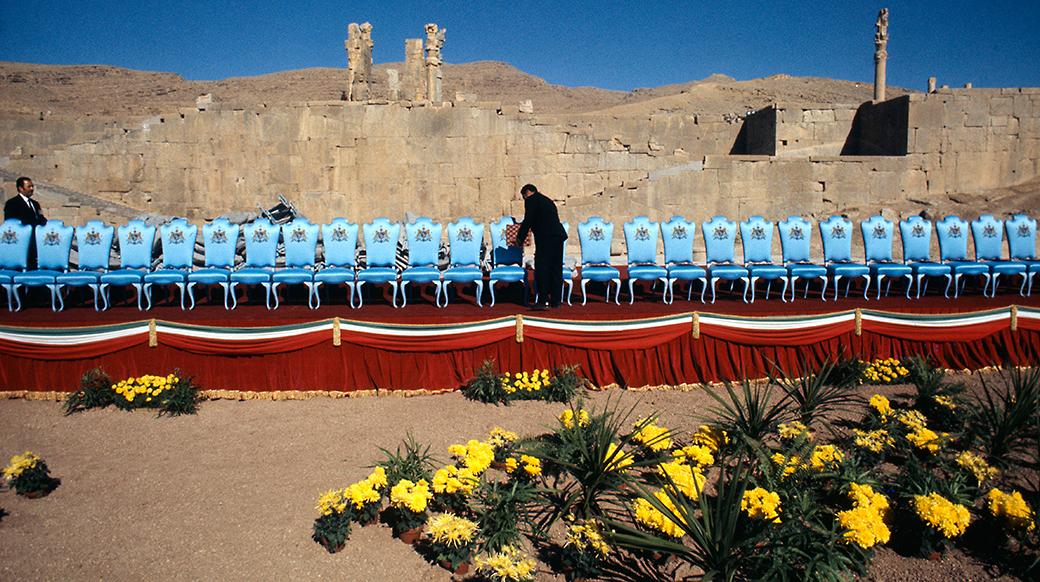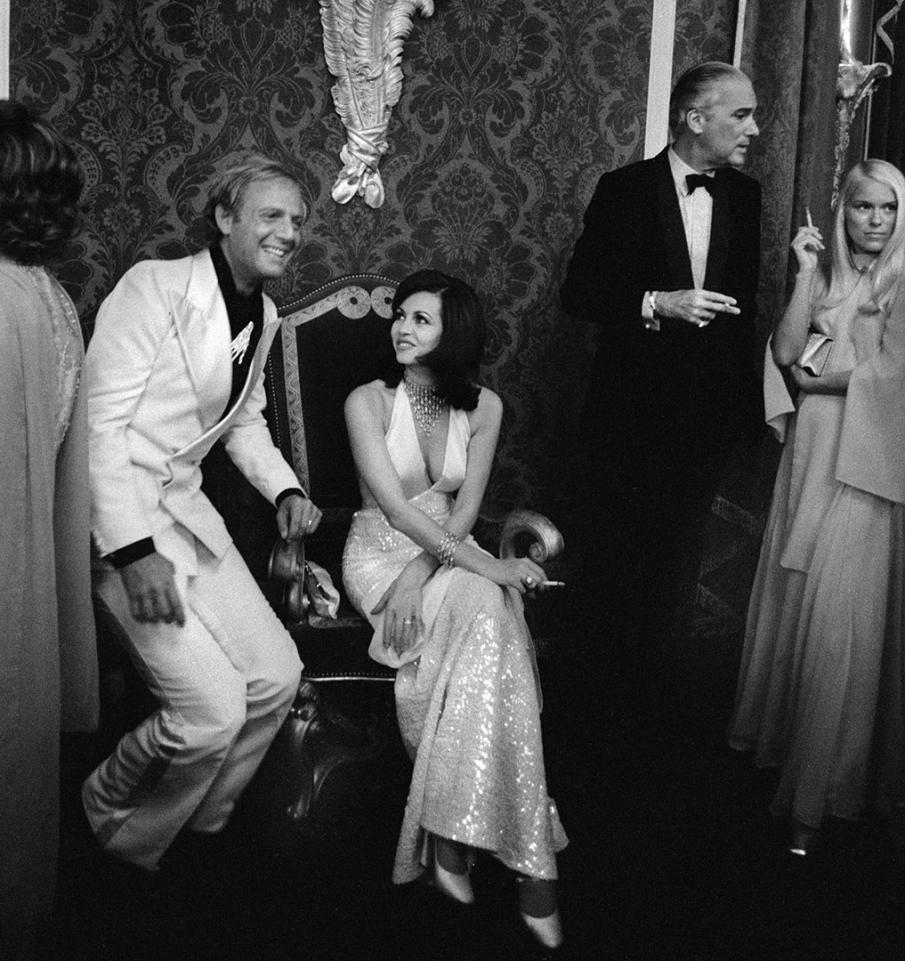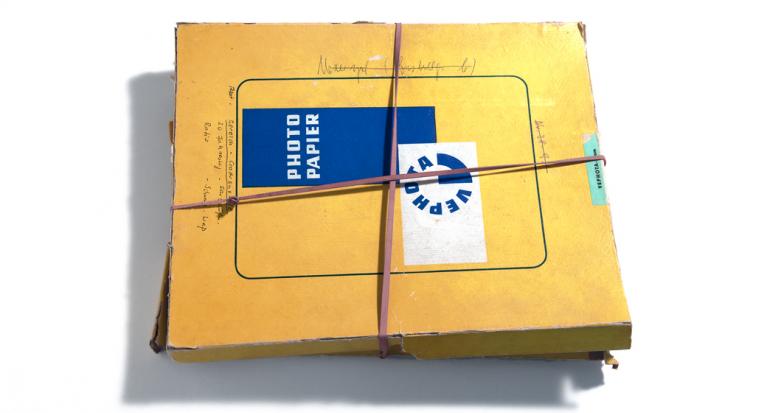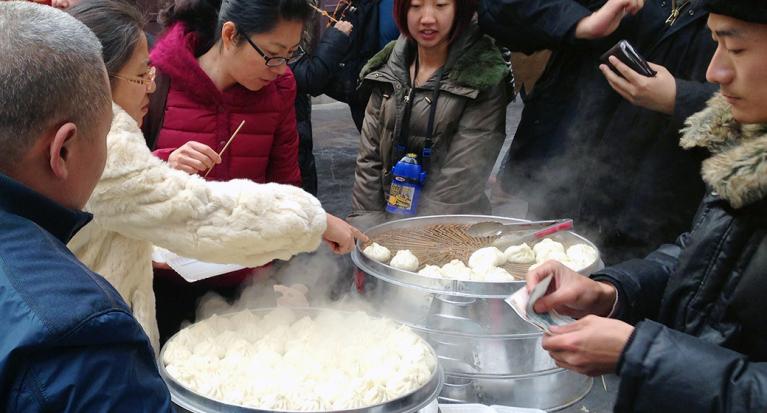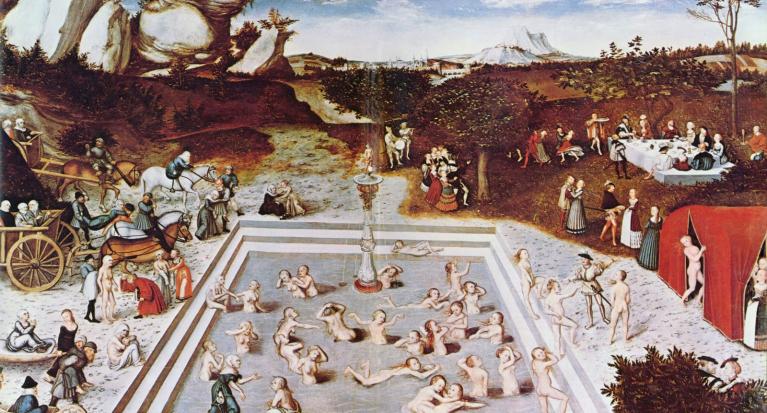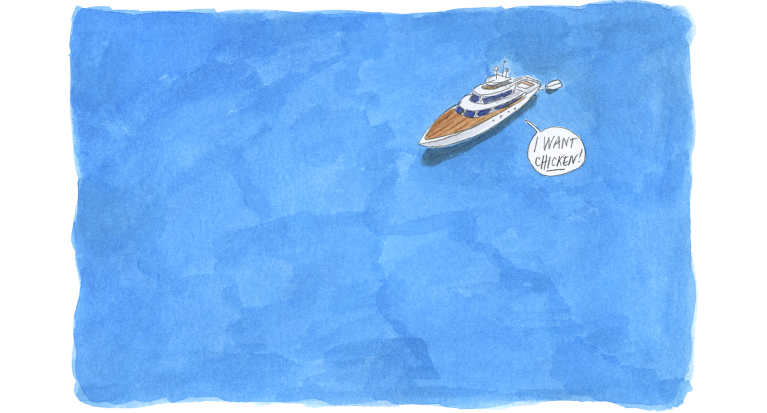The most expensive party ever
The staff recalls the Shah’s extravaganza.
“Allow me to introduce myself briefly: I’m Dante Franzetti and I just turned 80. Dio mio, in my life I’ve served just about everyone: Churchill, Frank Sinatra, Pope John XXIII. Even Greta Garbo. From 1964 until 1993 I was manager of the legendary King’s Club at the Palace Hotel in St. Moritz. I organised hundreds of parties there, for the Onassis and Agnelli families, for Flick, Heinecken, Heinrich Thyssen and the Rothschilds. And, of course, for the Shah, whom I knew from 1957 on. He was my very best client, along with Henry Ford II. I’ve undoubtedly experienced more intimate parties, but in size, Persepolis outdid all the others. Everyone wanted to attend, I mean, everyone. As for my position: I was the only waiter in a tuxedo. All the others wore uniforms.”
“But they were custom made! Our jackets were violet blue, in the colours of the imperial court. My name is Oswald Toutsch, I’m now 74. At the time, I was chef d'étage at the Palace. We were some 120 waiters and 40 cooks in Persepolis. Most of us were hired from the Palace or from Maxim's in Paris.”
Hugo Keusch, who was first head waiter at the Palace and head waiter in Persepolis, elatedly pronounced in Blick magazine four days before the party: “It will be the peak of our careers!”
“Poor Keusch. He had no idea what was in store for him,” says waiter Dante Franzetti.
A different time
1971: Mao was in power in China; Leonid Brezhnev, in the Soviet Union. The dictator Franco ruled Spain; and Richard Nixon, the USA. Students were protesting against the war in Vietnam and the Shah of Persia. The Shah’s visit to Berlin sparked the 1968 riots in Germany, after the police shot down student Benno Ohnesorg during a demonstration against “America’s puppet Pahlavi”.
Billion-Dollar Camping
In Persepolis, near the tomb of Cyrus I, the Shah planned to celebrate the 2500th anniversary of the founding of the Persian Empire, for three days, from 12 to 14 October, 1971. It would be “the biggest party on earth”, announced the Shah. He wanted to show the world the new face of an ancient empire, a modern and proud Iran, a nation of oil, not of Islamic mullahs.
As Farah Diba asserted 33 years later in her memoir, the royal family had to prove that the Pahlavi era was “a period of renaissance for Iranian civilization”. The Shah hired French architects, interior decorators and couturiers to design 50 tent-like suites for the royal visitors, right next to the ruins. A main tent, measuring 68m by 24m, was to be the banquet hall. The tent city took a year to build and 37 km of silk. The tents were arranged along five avenues, radiating out from a central fountain.
“Billion-Dollar Camping” read the headline in the Schweizer Illustrierte.
“The party of the century”, claimed Life magazine.
And according to Stern: “The mother of all parties”.
“It was magical, like in One Thousand and One Nights – except for the punch-up, but we’ll get to that later,” enthuses waiter Oswald Toutsch.
50,000 songbirds were flown in from Europe.
Three days later they were all dead.
“The ladies were provided with a separate bunker for their jewellery. As with their clothes, they had to change into something new for each meal,” recalls co-organiser Felix Real, 85. “Right next to the tent city they built an airfield, as well as a 1000-km motorway from Tehran to Persepolis. They also planted an entire forest next to the ruins. And to create atmosphere, 50,000 songbirds were flown in from Europe. Three days later they were all dead — the desert climate had been too much for them. At noon, temperatures topped 40, and at night they dropped below zero.”
Emil Real, 74, Felix’s brother and co-organiser: “Of course, we had a big kitchen, too. Iranian military machines flew in 150 tons of kitchen equipment, some 5000 kilometres, from Paris to Persepolis. Everything was of the very best quality, and I’ve seen some hotel kitchens in my day.”
Felix Real: “The culinary preparations for the celebration began in the summer of 1970, when the Iranians asked Louis Vaudable, the owner of Maxim's in Paris, to manage this part of the festivities. In those days, Maxim’s was considered the best restaurant in the world.”
Emil Real: “Three days before the gala banquet, eighteen tons of food arrived. According to the list, this included: 2700 kg of beef, pork and lamb. 1280 kg of fowl and game. And 30 kg of caviar — although some people claim it was 150 kg.”
“And a lorry full of ice,” waiter Oswald Toutsch adds.
“Everything was flown in from Paris, even parsley and chives. Only the caviar came from Iran,” Felix Real recalls.
“The director of Maxim's, Monsieur Louis Vaudable, believes that in the history of humankind there has never been a party as extravagant as this one,” reported the Bündner Zeitung.
Farah Diba remarked with annoyance in her book: “… what I discovered went against my Iranian sensibility: a host of foreign suppliers had been contracted, and among the most expensive, when we could have hired Iranians in certain areas. … Was it still possible to cancel these arrangements? I was told that the given time frame necessitated using European expertise.”
In the world’s capitals people were closely following who was planning to pay their respects to the Shah and who wasn’t. According to protocol, the most eminent guest was Haile Selassie, 79, Emperor of Ethiopia. He was accompanied by his daughter and his dog, Cheecheebee. With its diamond-studded collar, it never left the Emperor’s side, not even on the sofa. US President Nixon had Vice-President Spiro Agnew represent him. Queen Elisabeth of Britain sent her husband Prince Philip and Princess Anne. French President Pompidou first accepted, but then cancelled, which angered the Shah.
Everything was equipped to perfection.
Except for the coffee machine.
Dante Franzetti, waiter: “Everyone suspected that the only reason Pompidou wasn’t coming to Persepolis was because he wouldn’t be able to sit next to Empress Farah Diba. That seat was already reserved for Haile Selassie.”
“The serpentine table for the guests of honour was almost 70 meters long. 125 women spent six months embroidering the tablecloth,” reported Paris Match.
Emil Real, co-organiser: “I was responsible for room service in the 50 tent suites. Each of them had two bedrooms, two bathrooms, an office, and a lavishly furnished salon that could accommodate twelve people. A tapestry – with a picture of the head of state who was staying there woven into it – hung on the wall of each tent. A gift from the Shah.”
Felix Real, co-organiser: “Everything was equipped to perfection. Except for the coffee machine. At most it could make two cups at a time – for 500 guests! This could have been terribly embarrassing. Luckily I’d brought 20 kg of Nescafé from Vaduz with me. We ended up mixing big kettles of it.
My main job was the wine. To go with the first meat dish – saddle of lamb stuffed with champignons, roasted medium rare and garnished with tips of fresh asparagus – we served one of the world’s most superb red wines, a magnum Château Lafite Rothschild, vintage 1945. I tasted all the wines, first for poison and then for cork.”
In Maxim’s official journal of the festivities, listed under “Quelques precisions” were: 2500 bottles of champagne, 1000 bottles of Bordeaux, 1000 bottles of Burgundy, packed in 410 crates, delivered to a cellar built specially for this purpose in Persepolis four weeks before the celebrations began.
“We also had to test the glasses. They were crystal and their necks were ultra-thin, magnificent, wow! We tested by flicking our forefingers against them – and ping, a few hundred broke,” Rudolf Pazeller recounts, still with a tinge of regret today.
“As I said, I tasted every single wine, hundreds of bottles, but not even a drop trickled down my throat – I spat it all out. There was a strict ban on alcohol during the festivities. I also tasted all the sorbets. The champagne was from 1911 and had turned a pinkish colour. But not one bottle had gone bad, which was pretty astonishing for a 60-year-old champagne. The vintage cognac was from 1860. But we only had twelve bottles, not many for 500 guests. When I realized it wouldn’t be enough, I found two empty bottles and refilled them with Courvoisier. Nobody noticed.”
Rudolf Pazeller: “It’s time to mention the dishes served at the gala banquet. Here’s the original menu, on parchment:
Persepolis, le jeudi 14 octobre.
- Oeufs de Cailles aux Perles
- Mousse de Queues d'Ecrevisses
- Selle d'agneau des grands plateaux farcie et rôtie dans son jus
- Sorbet au vieux Champagne
- Paon à l'Imperiale
- Turban de Figues
- Café Mokka”
Menu from the festivities; in the possession of Rudolf Pazeller, who was a cook at the celebrations in Persepolis.
Criticism from the future ruler
“Let them go all the way to Mars or beyond the Milky Way; they will still be deprived of true happiness, moral virtue, and spiritual advancement and be unable to solve their own social problems,” roared Khomeini. Eight years after the “party of the century” he would chase the Shah out of the country and transform the Persian Empire into an Islamic theocracy.
“Should I serve heads of state bread and radishes instead?” was the Shah’s brusque reply.
Estimates of the costs vary, depending on the source, from 300 million to 2 billion Swiss francs.
“The attack was all the more unfair because most of the money spent for amenities considerably increased Iran’s assets: 2500 schools were opened for the occasion,” Farah Diba protested in her memoir. “In the eyes of the most fundamentalist clerics, the ceremonies themselves must have increased this cause for vexation – without our being really aware of it – since they began on 12 October 1971 at the tomb of Cyrus the Great, with this homage from my husband, spoken in a voice shaking with emotion.”
Mohammad Reza Pahlavi, self-proclaimed Shahanshah, King of Kings, Light of the Aryans, Shadow of the Almighty, began his grand speech with the following words: “Cyrus! Great King, King of Kings … you immortal Hero of History, father of the world’s most ancient empire, great liberator of all time, worthy son of mankind. … After 2500 years, the Persian flag waves as proudly as in your era of glory. … Today, as in your day, Persia bears the message of liberty and love of mankind in a troubled world … Cyrus, Great King, King of Kings…, you may rest in peace, for we are vigilant and will remain so forever.”
The punch-up
Dante Franzetti: “A day after the parade was the gala banquet. Green, red and yellow traffic lights were installed at the entrances of the big tent to make sure all the waiters entered at the exact same moment. It worked absolutely perfectly.”
“That’s right. Though we did have problems with the French,” Oswald Toutsch retorts. “We Swiss waiters arrived in Persepolis a few days before the French ones, and Hugo Keusch, our boss, started organising everything immediately. But then, at the last moment, the staff from Maxim’s arrived – and they thought they knew how to do everything better. Of course, Hugo didn’t like that at all.”
Two of the French guys held him, while a third guy punched him right in the face with his fist.
Emil Real: “True. The stars from Paris just told us to do it like this or like that. Which led to a punch-up. Just imagine – a day before the big banquet!”
Felix Real: “Poor Herr Keusch… he even got a bloody nose!”
Dr. Eugen Riedi: “Two of the French guys held him, while a third guy punched him right in the face with his fist. It took only ten seconds and, I must say, it was a very professional lesson in how to get rid of an opponent. Since I was responsible for the medical care of the personnel, I treated Keusch afterwards.”
Oswald Toutsch, waiter: “Then they told him that his mother in Switzerland had unexpectedly passed away. Keusch left on the spot for Tehran. By the time he found out it was just a trick to get rid of him, the festivities were over.”
“I didn’t want to mention it, but unfortunately that’s what happened,” said Franzetti.
Gerhard Müller, chef: “The kitchen was like an oven, with all those gas stoves. Sixteen hours a day, it was as tough as working in a mine.”
“In anticipation of these days, for the first time in my life I asked my doctor to prescribe some tranquilizers for me. ... The kitchen staff had to be kept happy, given a helping hand, and sometimes comforted, and catastrophes had to be averted,” wrote Farah Diba in her memoir.
Blick quoted Princess Anne as saying: “I’ll never eat another peacock!”
Gerhard Müller, chef: “We ended up clearing away three-quarters of the cold buffet, the guests were simply full to bursting.”
Emil Real: “At noon, on the day before the big dinner, Tito consumed a whole turkey. And Haile Selassie, a duck.”
Oswald Toutsch, waiter: “By the way, I spilled a drop on Tito’s white uniform. He didn’t say a word, just quickly rubbed it off his sleeve with his hand.”
Emil Real: “Though after the banquet, Soviet President Podgorny had to be supported on both sides, one man to his right and one to his left. In Podgorny’s tent, the drink was whiskey; in Vice-President Agnew’s, vodka.”
The Bündner Zeitung claimed that: “12,000 bottles of whiskey were flown into Persepolis.” Other papers spoke of 25,000 bottles.
Business, not women
“Grace Kelly, Princess Grace of Monaco, was the most beautiful,” confirms men’s cloakroom attendant Anna Nutt.
“But the men had absolutely no time for women in Persepolis. Except when they were eating, everything revolved around politics and business. Just like in St. Moritz. When the Shah was there, everyone wanted to talk to him, to get into the Iranian oil industry. Some guests even offered me money to introduce them to the Shah. Of course, that was out of the question,” recalls waiter Dante Franzetti.
“Of all the tasks that fell to me in the preparation for the festivities, coping with (the press) was the most difficult and depressing, for just as I had predicted, a wave of acerbic criticisms about expenditures on luxuries slowly arose from the West. The journalists got on this hobbyhorse, and rode it again and again. What kind of monarchy is dressed by Lanvin and eats at Maxim’s when its people still sometimes lack food and schools? … A final fireworks display was held on this occasion and, in the last group photo, I can clearly be seen giving a sign of relief,” concluded Farah Diba.
Oswald Toutsch, waiter: “At the end of the three-day celebrations, loads of goods were left over, and when the soldiers began tossing whole crates of wine into rubbish bins, we waiters ran over to them like crazy, saying, dear Lord, please help us save as much as possible.”
Gerhard Müller, chef: “Just imagine: soldiers emptying the wine from opened magnum bottles over their shaved heads and not drinking a drop! Even today I can hear Andrea Badrutt, proprietor of the Palace, who had also been invited to Persepolis, shouting: ‘Gerhard, the soldiers are throwing everything away, wine, plates, cutlery.’
“Afterwards, if I remember rightly, the plan was for Club Méditerranée to use the tent city for tourists. But it wasn’t long before everything was dirty and frayed.”
Credits
DOSSIER Amazing Feasts |
| The most expensive party ever | |
| Cow tongue and venison | |
| The biggest buffet imaginable | |
| In the land of Cockaigne | |
| All dossiers | |
